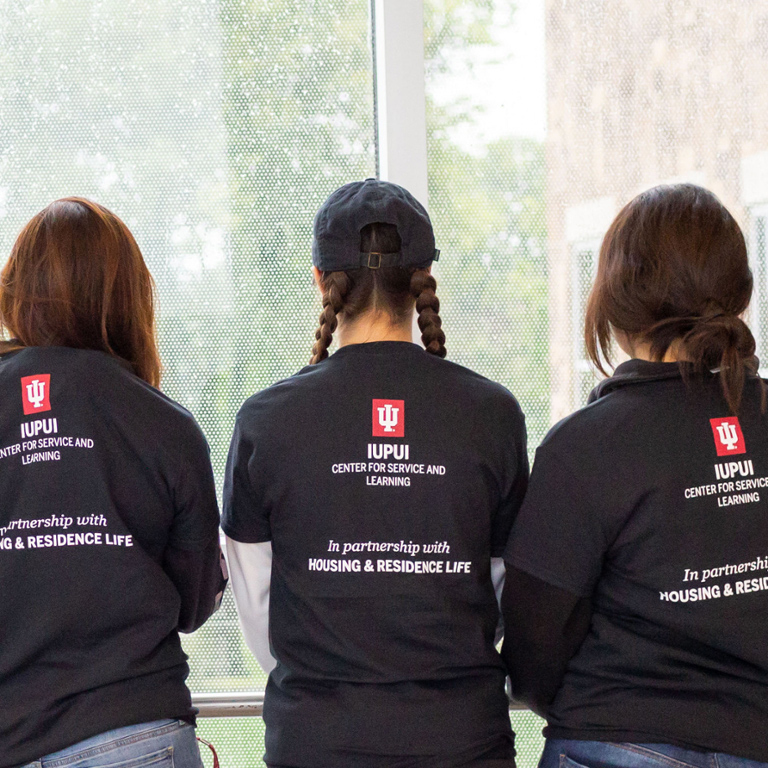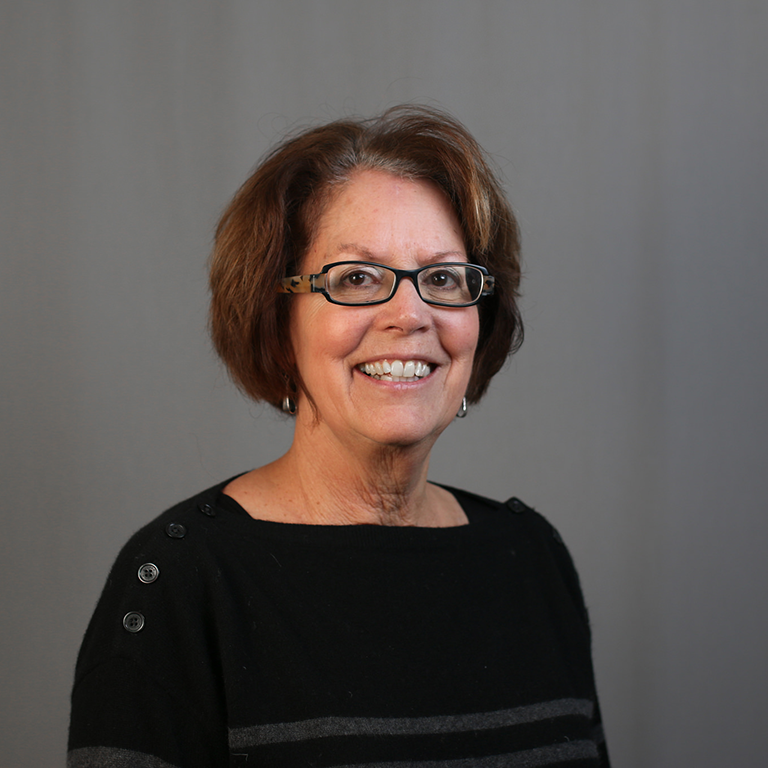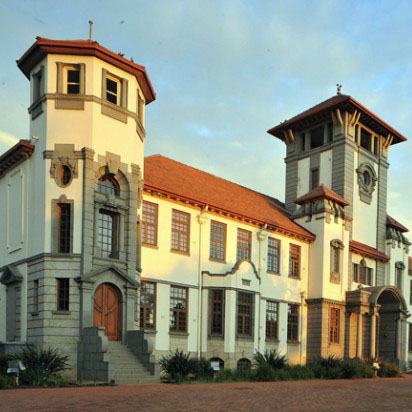In 2015, IUPUI contributed 365,206 service hours to the Indianapolis community through a wide range of campus-sponsored events, including volunteering, service-based scholarships, and service learning courses. Across the years, IUPUI’s civic involvement has not lagged; in fact, it has only grown with IUPUI solidifying its status among institutions of higher learning by its intensive focus on service learning courses and civic engagement. This focus is supported by the Center for Service and Learning (CSL), a unit on campus that works to promote meaningful interaction between the Indianapolis community and IUPUI’s students, faculty, and staff. The many functions of the center might not be clear at first glance, so a dive into the world of civic engagement will yield a stronger understanding of not only CSL’s role on campus, but also IUPUI’s role within central Indiana.

In honor of CSL's 25th anniversary, Dr. Julie Hatcher, director and co-founder of CSL, provided her perspective on IUPUI's relationship with civic engagement and service learning. In addition to directing the center, Dr. Hatcher is associate professor of philanthropic studies in the Lilly Family School of Philanthropy. She serves as the co-editor of the IUPUI Book Series on Service Learning Research, and she collaborates on both local and international research projects integrating service learning into higher education.

IUPUI’s Role in Student Civic Engagement
Located in the heart of downtown Indianapolis, IUPUI has a unique opportunity as a metropolitan university in terms of community engagement. While other universities may be more loosely tied to nearby cities, Dr. Hatcher sees the relationship of IUPUI and the community as one of symbiosis:
“IUPUI is a state-funded school, and it’s location is in close proximity to government, museums, schools, nearby community settings . . . so the community becomes this additional classroom that helps to deepen and enrich learning of students across all disciplines and majors. . . . I think we have a public responsibility as a state-funded school to continually be more engaged in and with the community.”
CSL’s research, in part, examines this aspect of partnerships between the campus and community. Dr. Hatcher is familiar with the ways in which this relationship can manifest to support student learning. She explains, “I think the boundaries between the campus and the community here are physically more permeable that at other campuses; it’s easier to ebb and flow both from campus into community, and that also sort of facilitates community engagement from a student learning perspective.”
IUPUI is so closely integrated with the culture of Indianapolis that the two cannot be separated, and just as the city contributes to the campus, likewise the campus should be giving back.
I think we have a public responsibility as a state-funded school to be more engaged in and with the community.
Dr. Julie Hatcher
Since the tie between community and campus is so vital, CSL explores what motivates students to participate in civic engagement, and with that information, CSL determines how IUPUI can best leverage the motivations of students to maintain strong campus-community connections. Based on her experiences, Dr. Hatcher lists many reasons for student involvement, including their past experiences, desire for involvement, and personal goal setting. To her, the best way IUPUI can engage students in the local community is through course-based service learning. She states:
“All college students, in particular students at IUPUI . . . are balancing lots of different responsibilities, so to be involved in co-curricular activities might not always make sense. But if you can integrate these kind of experiences in a course-based setting, I think that’s a great way for students to be involved in service that becomes educationally meaningful to them and helps them to understand course material in a new way or helps them to see how these experiences can be applied in real-world settings.”
According to the IUPUI Community Engagement Report, from 2006 to 2015, the number of course sections integrated with service learning increased from 119 to 561, with the number of involved students increasing from 2,659 to 8,649. Both undergraduates and graduate students participate in service learning courses. Faculty from virtually every school on campus are involved in designing, implementing, and assessing service learning course outcomes. As a high-impact teaching practice, service learning results in persistence and retention, academic learning, personal and professional development, and civic learning. In service learning courses, students learn to work effectively with others and encounter the diverse perspectives of others. These are the types of outcomes that employers seek.
Mutually Beneficial Partnerships
With the responsibility of the campus toward the local community in mind, IUPUI students need to be engaging in civic interaction that not only allows them to grow as students, but also provides the community with services that are valuable. Dr. Hatcher learned the importance of this sort of attentiveness to course design in the early 90s, when CSL was invited to assist a university in South Africa in developing service learning courses:
“We had the opportunity to be partnered with the University of the Free State in Bloemfontein, South Africa, and we hosted a team of faculty here, and then we went to South Africa and had faculty development workshops. . . . this was the brick that was made at that point, and the person who was a faculty member in South Africa worked with community partners to come up with a new system of brick making in order to have community members involved with creating the bricks. As an engineering faculty, his research focused on 'how long do these bricks last, how can we make them more sustainable?' And it was one of these great examples of the purpose of community-engaged work, because we need to always be attentive to, 'what are the bricks being developed, do we have outputs that are actually valued by the community, and are the community members closely aligned with creating these bricks and these products?'"


Left: Dr. Hatcher's brick pieces. Right: One of the historic buildings at the University of the Free State. Photo source: myproperty.co.za.
Dr. Hatcher shared this story as one of her most foundational and meaningful experiences with CSL; it helped her discover the true purpose of civic engagement for communities. According to Dr. Hatcher, IUPUI believes that “civic engagement is work that’s done in and with communities, not to and for communities,” and without this mind-set, it’s easy to lose sight of why CSL does its work—to help improve the quality of life for both IUPUI students and the community.
Global and Local Presence
Since the Center for Service and Learning has been operating for 25 years, it has made a longstanding impact on IUPUI. It’s also part of a growing global community centered on civic engagement and service learning. Dr. Hatcher remarked on the broad scope of the research surrounding service learning and the rewards to be gained from such a wide community:
"Being able to meet others, not only from other universities across the country, but scholars worldwide, who are now looking at service learning and community engagement, whether that’s Ireland or Netherlands or Spain or Hong Kong, it just doesn’t matter where; in Latin America, in the Middle East, in the Far East, you have many different associations that are trying to do this type of work, and that’s very rewarding to be a part of a movement from the early days until now and see the growth of civic engagement in higher education across time.”
On a more local scale, Dr. Hatcher says that IUPUI’s civic engagement is one of the many reasons that younger faculty are attracted to IUPUI. They recognize that IUPUI is a place in higher education where new forms of engaged teaching and engaged research are valued. She states, "I think that the Center for Service and Learning has a particular role, and that particular role is around faculty development. In the same way that students and community partners are critical to this process, so are faculty. We work with faculty to cultivate their imagination around either course design or around public scholarship.”
Faculty are a constant on campus. A professor or lecturer will usually be here longer than any single student, and so faculty can have a sustained impact across several years. The IUPUI Community Engagement Report shows that from 2009 to 2015 the number of faculty who participated in civic engagement increased from 92 to 209, a truly dramatic rise in interest and involvement. With faculty as a prime example of civic engagement, students also have models for their own civic-minded dispositions and behaviors.
Moving Forward
CSL has made great strides in working with faculty, staff, and students from all schools at IUPUI, but there’s always more work that can be done and more steps that can be taken. Even though Dr. Hatcher’s upcoming retirement will result in a leadership change, she believes that “because enough people care and enough people have walked the road of civic engagement, I’m quite confident that there will be other people who will be able to lead this effort, moving the campus and the community forward in new ways.” The Center for Service and Learning will continue to promote student and faculty engagement, develop community-engaged learning experiences, and continue exploring ways in which involvement between IUPUI and Indianapolis can be deepened and sustained through mutually beneficial partnerships.
More information about how to become involved with the Center for Service and Learning can be found at https://csl.iupui.edu/index.html.
For more information, contact the Division of Undergraduate Education Office of Communications at duecomm@iu.edu.

